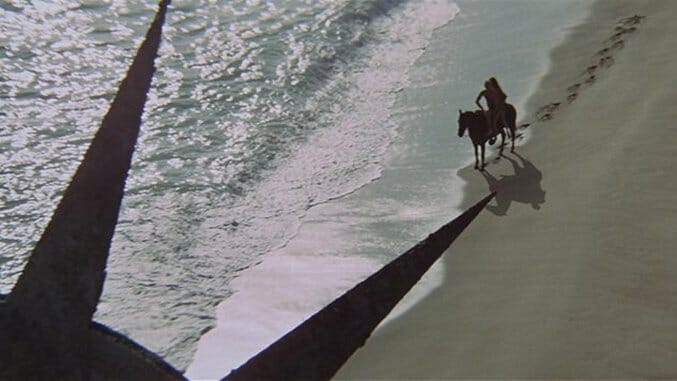You Blew It Up: Every Planet of the Apes Ranked

“What will he find out there, doctor?” “His destiny.” That’s what the conservative ape scientist Dr. Zaius (Maurice Evans) tells compassionate ape “veterinarian” Dr. Zira (Kim Hunter) at the end of the original Planet of the Apes, as misanthropic astronaut George Taylor (Charlton Heston) sets out into the Forbidden Zone of this topsy-turvy planet—where intelligent, talking apes are the dominant species and humans are dumb beasts—in order to find out what really happened to his species. Unless you were living under a rock for the last 50 years, you know exactly what he will find.
But why does Zaius call this literally earth-shattering revelation Taylor’s destiny, and not his past, which is technically the case? The answer for that lies within Zaius’s role in the ape society. Unlike all other apes, Zaius knows the history of the painful and complex relationship between apes and humans. He knows how humans’ natural attraction to war, persecution, prejudice and cruelty sealed their eventual doom, and is (perhaps vainly) attempting to keep that “intellectual virus” from spreading to his beloved apes. He knows that once an intelligent human like Taylor has a chance to restart yet another attempt at civilization for his species, the same ugliness and destruction that comes with his inner nature will certainly plague his descendants. Therefore, he knows that Taylor will find both his past and his future on that beach.
Today, the Planet of the Apes franchise is still going strong. The timeless appeal of these films stems from the fact that they explore high-concept themes, like the inherent viciousness and frailty of human nature, with brutal clarity, told with a refreshing lack of condescension and philosophical hand-holding. By presenting a fable world where what we now consider to be animals are dominating humankind, they hold a mirror to our ugliness, arrogance and, just maybe, our chance for redemption. Every installment and reiteration of the franchise contains a handful of characters who struggle to go against their basest urges and strive to bring compassion and peace to their kind. Yes, these films never forget to cultivate the value of hope for a peaceful world, but they’re never naïve enough to attempt to sell the audience on the idea that it’s an easy feat—as evidenced by the unfortunately yet appropriately bleak endings found in most of them.
As much as every Apes film tackles the similar themes and plotlines, not all of them are created equal. The series is split into various sections: First, there are the five original films made between 1968 and 1973. Then there’s the weird Tim Burton one we’re contractually obligated to mention. Finally, we have the terrific new reboot series, starting in 2011, which is continuing past its solid initial trilogy.
Still, in an attempt at solidarity, let’s rank every single Planet of the Apes movie:
10. Battle for the Planet of the Apes (1973)
By the time the fifth and final entry in the original series went into production, 20th Century Fox had already made the decision to move the franchise into television, as evidenced by the short-lived 1975 TV series. Therefore, the suits unceremoniously slashed the budget of Battle enough to turn it into a glorified TV movie. This doesn’t seem to have sat well with director J. Lee Thompson, who had previously created the most kinetic and daring entry in the series yet with 1972’s Conquest for the Planet of the Apes, and who appears to be on autopilot here as he blandly puts together a mish-mash of plot points and themes already explored in great detail during previous films. The story revolves around benevolent and strong ape leader Caesar’s (Roddy McDowall) struggles to achieve peace between apes and humans after the revolution in which apes took over the world, a premise mostly used to create a more kid-friendly version of the first Planet of the Apes. That’s not a coincidence, since the studio explicitly demanded a lighter touch after being irked by the impressively brutal ending of the series’ fourth installment, a demand which led to a misguided attempt of rewriting the perfectly structured time loop that episodes 1-4 create in favor of an awkward coda where the apes’ and humans’ destinies are retconned. Perhaps that’s why I skip this one whenever I do my occasional Apes marathon. (Side note: Try watching the first four in the order of 3, 4, 1 and then 2 to get the chronologically linear experience). Not only does it throw a monkey wrench (pun totally intended) into the whole operation, but it’s also fairly inconsequential.
-

-

-

-

-

-

-

-

-

-

-

-

-

-

-

-

-

-

-

-

-

-

-

-

-

-

-

-

-

-

-

-

-

-

-

-

-

-

-

-








































